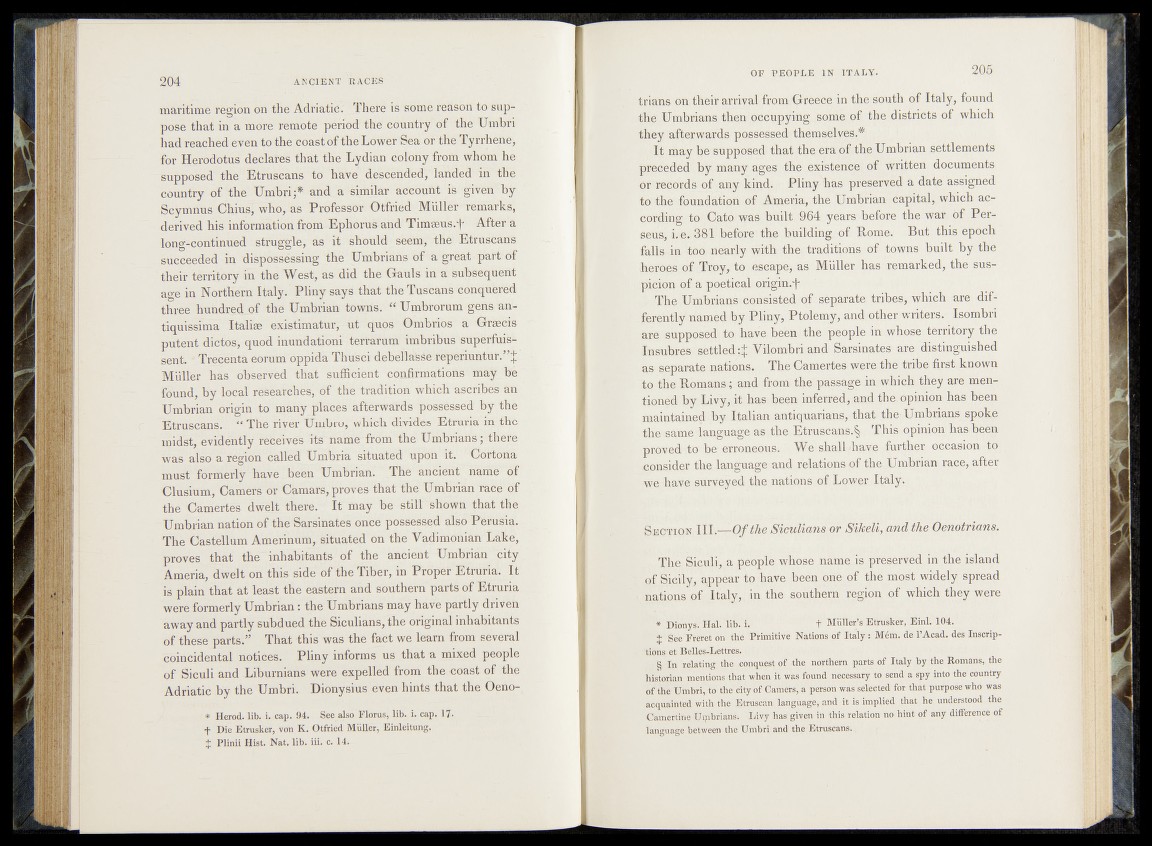
maritime region on the Adriatic.' There" ié some reason to suppose
that in a móre remote period the* country' of ;the; Umbri
had reached even to the'coast óf the LoVVerSèa<órvthe Tyrrhene,
for Herodotus declares that the Lydian colony from whom hè
supposed the Etruscans to have descended^ landed in the
country of the Umbri;* and a similar aCcouht J^giVén'*'by
Scymnus Chius, who, as Professor Otfried Miiller •TèrSarkS;
derived his information from Ephorus and Timseus.-f After a
long-continued struggle, as it should seem,' the Etruscans
succeeded in dispossessing the Umbrians of a^grëat-jtót’óf
their territory in the West, as did the Gauls in a subsequent
age in Northern Italy. Pliny says that the Tuscans cohqtifered
three hundred_of the Umbrian towns. “ Umbrorum gens an~
tiquissima Italiae existimatur, - ut quos Ombrios' a Grmcis
putent dictos, quod inundationi terrarum imbribüs siipëifuisi
sent. * Trecenta eorum oppida Thusci debella%se-re'pêriuntur.” |-
MuTler has Óbservéd that sufficient cQnfirmatiöhs^maiy_ bte
found, by local researched of the tradition whicli%sdrih0i^i
Umbrian origin to manyjdacés afterwards p'óêsèssèd,by the
Etruscans. “ The rivèr Umbro, which divides Etruria in the
midst, evidently received its name from the Umbrians; there
was also a region called Umbria situated, upon it. Cortona
must formerly have been Umbrian. The anëient name óf
Clusium, Camers or Camars, proves that the Umbrian race'<ff
the Camertes dwelt there. I t may be stilTshown that the
Umbrian nation of the Sarsinates once possessed also Pbrusia.
The Castellum Amerinurn, situated on the Vadimonian Lakt,
proves that the inhabitants of the ancient Umbrian city
Ameria, dwelt on this side of the Tiber, in Proper Etruria. It
is plain that at least the eastern and southern parts of Etruria
were formerly Umbrian: the Umbrians may have partly driven
away and partly subdued the Siculians, the original inhabitants
of these parts.” That this was the fact we learn from several
coincidental notices. Pliny informs us that a mixed people
of Siculi and Liburnians were expelled from the coast of the
Adriatic by the Umbri. Dionysius éven hints that the Oeno-
* Herod. 1% L cap. 94. See also Floras, lib. i. cap. 17-
f Hie Etrusker, vón K. Otfried Muller, Einleitung.
% Plinii Hist. Nat. lib. iii. c. 14.
tria-ns on.tlieitf Etpriyal from Greece in the south of Italy, found
the Umbrians*Th;^ ^ c hpyi|ig;tsotn,e;o%C|ie districts of which
they laftopwards pQ,ssqSsedt thémselvösV*
It may'bers^^Së,^hfbat the,er;a;,pf theUmbrian settlements
preceded by m-ahy^a^elMlïé-'. of wyj$ten documents
or ?record&:of }a$y kind. Pijnymas preserved a date assigned
tö^thê^fcund;atipn of Ameria, ih^e-Umbrian' capital, which ac-
ct^d^ng'Jtp^jQgito^v^d-hmlt the war-iöf P e ^
seus, i:q |^ § ^ befÓT.e; the buildiblg-'of. Rome. But this epoch
falls* in -too ne'arly with the* traditions o^te\y«psibuilt by the
hpro^s öf/Troy, to ?|M^aip.eyras Miiller has' *repiarked, the sus-
Cipièn q£;a ’ppehcahoriginid-.
- The Umbrian^f(^§s{e| o ftse ^ ra te tribes, which.-are di£*
ferentlyf ri&med by Pl$|y, P t o l emy , , ; ^ n 4 | | r o e r . ' W p g
are sqppohe^^9 have,*jhd ^ ^thb^peplplp in whosé|territory the
In^pbfësise.ttledd; Vilömbri and;iSarsip|aj|si ^re^disto^uished
as separate nations.,, Th^Camertès^^WMp^tTibe' fiysti known
to th,e 'Roqi^nsij, and "from, t^ p E ^ a g p * if which they are'men-
t io n e f i ïb pLiv y - h'a;s' b.een in f e r r e d ^ n d } ^ been
maintained Iby. Italian antiquarians, that the^Tmbriaps' spoke
&.he'ïsamédanguagê.as the Etrjjscan^.^ This'.opinion has been
proved* to be, erroneous^ We- shal 1 fha^e L* further occasioned
Consider %^laqguagqran^reIafti^ lis^ f^ f^ Jip b rian race, aftpj'
we have, sury^pd‘jthe^nati,Q(n s||4 Lower Italy.
A ction H I.—-Of the Siculians or Sikeli, and the Oenotrians.
The Siquli, a people whose .nameddprqspyèd, in the island
of Sqily, appear to ,have ib'ee^ oiïdof thé most widely spread
nations of Italy,, in the southern which they were
* Dionys. Hal. lib.T *' 41 EtruSkër.'Eiril.’ 104.' *
' + See Freret on the Primitive Nations of Italy*: Mém. de l’Acad. des Inscrip-
'tiöns. et Belles-Lettres.
S In relating the .conquest of^the northern parts of Italy by ,the Romans, the
historian meqtio|s that -when i t ^ s s |^ ü |d _ necessary to send a spy into the’country
of the tlmbri, W tfie ity o f Carriers,’a person was seïeotedhör that purpose who Was
acquainted with the Etruscan language, and it iVimplied^that he understood the
Camertine4jipbrians. Livy has given in this relation no hint of any difference of
language between the Umbri and the'Etruscans..,